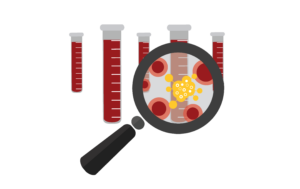The stage at which cancers are detected is one of the most important factors in determining patient survival. Yet not everyone regularly receives recommended routine screenings for common cancers, which contributes to disparities in cancer survival rates among Black and Latino patients.
A new white paper published by the USC Schaeffer Center focuses on the potential benefit of multi-cancer early detection (MCED) blood-based tests to reduce disparities in late-stage cancer diagnosis among minority populations. A single test can detect multiple cancers and does not require a specialist to administer it, write the authors.
“The cancer death rates are 19% higher for Non-Hispanic (NH) Black men and 13% higher for NH Black women than their NH white counterparts,” says Alison Sexton Ward, research scientist at USC Schaeffer Center. “Tests that remove many of the economic and social barriers that limit access to screenings should lead to cancers being caught earlier in these vulnerable populations.”
Barriers to Cancer Screenings for Black and Latino Patients
The U.S. Preventive Services Task Force (USPSTF) recommends routine screenings for breast, cervical, and colon cancers for all groups, and lung, prostate and ovarian cancers for patients with significant risk factors.
While mortality rates for specific cancers have dropped in recent years, racial and ethnic minorities are less likely to receive recommended cancer screenings and more likely to be diagnosed with cancer at later stages.
Sign up for Schaeffer Center news
Economic and cultural factors among Black and Latino patients reduce access to these types of screenings and erode trust in the healthcare system. Those who do receive screenings often experience lower quality of care, less reliable screenings, and less frequent follow-up tests.
“The consequences of lower screening rates among minority patients are especially severe because Black and Hispanic communities experience higher incidences of cervical cancer, colon cancers and aggressive forms of breast cancer,” says Karen Van Nuys, executive director of the USC Schaeffer Center’s Value of Life Sciences Innovation Program and assistant professor at the USC Price School of Public Policy.
Broader Access to Multi-Cancer Blood-Based Tests May Reduce Late-Stage Diagnosis
MCED blood-based tests can address several current challenges with screening access, find the authors. The tests rely on the analysis of cell-free DNA and machine learning to detect and locate different cancer types using a single blood sample. They have the potential to address both the tremendous unmet need in unscreened cancers as well as some of the disparities with current screening programs as they do not require specialist visits and can be used by primary care physicians. Lab-based blood tests are generally more consistent regardless of facility quality, the authors write. The tests could also be used in younger patients at high cancer risk before other types of screening are recommended.
Despite the potential of multi-cancer blood-based tests, the opportunity to increase cancer screenings and reduce racial disparities will depend on access to the tests for Black and Hispanic patients.
“If test adoption is lower among physicians in minority communities, or insurance coverage is lower, then multi-cancer, blood-based testing could increase disparities in early cancer detection,” says Darius Lakdawalla, Director of Research at the USC Schaeffer Center. “The promise of these tests will only be realized if we are able to provide broad access to vulnerable populations.”



